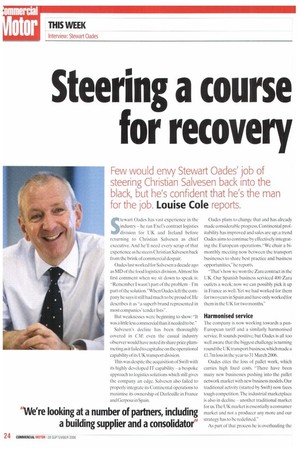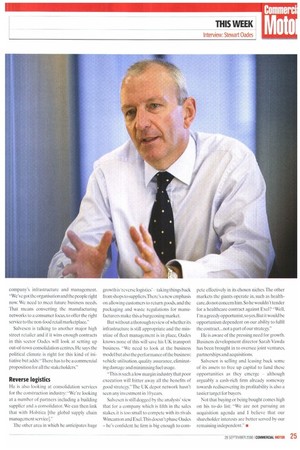Steering a course for recovery
Page 24

Page 25

If you've noticed an error in this article please click here to report it so we can fix it.
Few vvould envy Stewart Oades' job of steering Christian Salvesen back into the black, but he's confident that he's the man
for the job. Louise Cole reports, Stewart Oa des has vast experience in the industry — he ran Exel's contract logistics division for UK and Ireland before returning to Christian Salvesen as chief executive. And hell need every scrap of that experience as he steers Christian Salvesen back from the brink of commercial despair.
Oades last worked for Salvesen a decade ago as MD of the food logistics division. Almost his first comment when we sit down to speak is: 'Remember I wasn't part of the problem —I'm part of the solution."When Oades left the company he says it still had much lobe proud of. He describes it as -a superb brand represented in most companies' tender lists-.
But weaknesses were beginning to show: "It was a little less commercial than it needed to be."
Salvesen's decline has been thoroughly covered in CM; even the casual industry observer would have noted its share price plummeting as it failed to capitalise on the operational capability of its UK transport division.
'Ibis was despite the acquisition of Swift with its highly developed IT capability — a bespoke approach to logistics solutions which still gives the company an edge. Salvesen also failed to properly integrate its Continental operations to maximise its ownership of Darfeuille in France and Gerposa in Spain. Oades plans to change that and has already made considerable progress. Continental profitability has improved and sales are up; a trend Oades aims to continue by effectively integrating the European operations. "We chair a bimonthly meeting now between the transport businesses to share best practice and business opportunities," he reports.
"That's how we won the Zara contract in the UK. Our Spanish business serviced 400 Zara outlets a week; now we can possibly pick it up in France as well. Yet we had worked for them for two years in Spain and have only worked for them in the UK for two months."
Harmonised service
The company is now working towards a panEuropean tariff and a similarly harmonised service. It sounds positive, but aides is all too well aware that the biggest challenge is turning round the UK transport business, which made a £1.7m loss in the year to 31 March 2006.
Oades cites the loss of pallet work, which carries high fixed costs. "There have been many new businesses pushing into the pallet network market with new business models. Our traditional activity (started by Swift) now faces tough competition. The industrial marketplace is also in decline — another traditional market for us.The UK market is essentially a consumer market and not a producer any more and our strategy has to be redefined."
As part of that process he is overhauling the
company's infrastructure and management. "We've got the organisation and the people right now. We need to meet future business needs. That means converting the manufacturing networks to a consumer focus, to offer the right service to the non-food retail marketplace."
Salvesen is talking to another major high street retailer and if it wins enough contracts in this sector (Jades will look at setting up out-of-town consolidation centres. He says the political climate is right for this kind of initiative hut adds: "There has to be a commercial proposition for all the stakeholders."
Reverse logistics
He is also looking at consolidation services for the construction industry: "We're looking at a number of partners including a building supplier and a consolidator. We can then link that with Holstica [the global supply chain management service]."
The other area in which he anticipates huge growth is 're verse logistics'— taking things back from shops to suppliers.There's a new emphasis on allowing customers to return goods, and the packaging and waste regulations for manufacturers make this a burgeoning market.
But without a thorough review of whether its infrastructure is still appropriate and the minutiae of fleet management is in place, (Jades knows none of this will save his UK transport business. "We need to look at the business model but also the performance of the business: vehicle utilisation, quality assurance, eliminating damage and minimising fuel usage.
"This is such a low margin industry that poor execution will fritter away all the benefits of good strategy." The UK depot network hasn't seen any investment in 10 years.
Salvesen is still dogged by the analysts' view that for a company which is fifth in the sales stakes, it is too small to compete with its rivals Wincanton and Exel.This doesn't phase (Jades — he's confident he firm is big enough to corn pete effectively in its chosen niches. The other markets the giants operate in, such as healthcare,do not concern him. So he wouldn't tender for a healthcare contract against Exel?
I'm a greedy opportunist,so yes. But it would be opportunism dependent on our ability to fulfil the contract.., not a part of our strategy."
He is aware of the pressing need for growth. Business development director Sarah Vawda has been brought in to oversee joint ventures, partnerships and acquisitions.
Salvesen is selling and leasing back some of its assets to free up capital to fund these opportunities as they emerge — although arguably a cash-rich firm already someway towards rediscovering its profitability is also a tastier target for buyers.
Not that buying or being bought comes high on his to-do list: "We are not pursuing an acquisition agenda and I believe that our shareholder interests are better served by our remaining independent." •
































































































































































































